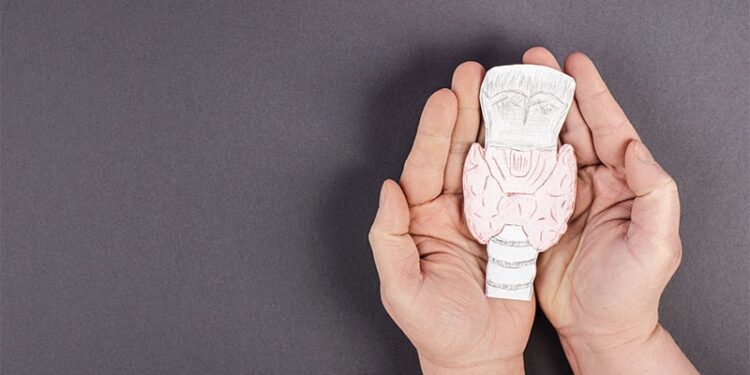TOPLINE:
Pregnant women with decreased levels of free thyroxine (FT4) and isolated hypothyroxinaemia (defined as having normal thyroid-stimulating hormone [TSH] and low FT4 concentrations) had a substantially higher risk of developing gestational diabetes, challenging the long-held assumptions that subclinical hypothyroidism and thyroid autoimmunity are risk factors for the condition.
METHODOLOGY:
- Researchers performed a meta-analysis of individual participant data to investigate the association between maternal thyroid function and the risk for gestational diabetes involving 63,548 pregnant women (median age, 29 years; overall mean prevalence of gestational diabetes, 4.7%) from 25 prospective cohorts worldwide, including both published and unpublished studies.
- Exposures comprised thyroid dysfunction (subclinical hypothyroidism, isolated hypothyroxinaemia, overt hyperthyroidism, and subclinical hyperthyroidism) and measurements of thyroid function tests for TSH, FT4, free triiodothyronine (FT3), total T3, FT3:FT4 ratio, and antibodies indicative of an autoimmune thyroid disease.
- The primary outcome was the occurrence of gestational diabetes (as defined for each cohort).
- Secondary outcomes included serum glucose measurements during an oral glucose tolerance test (at 24-28 weeks of gestation), the homeostatic model assessment for insulin resistance, and fasting insulin measurements.
TAKEAWAY:
- In a meta-analysis of 17 cohorts involving 45,900 participants, isolated hypothyroxinaemia was associated with a higher risk for gestational diabetes than euthyroidism (absolute risk, 6.5% vs 3.5%; adjusted odds ratio, 1.52; P = .0017).
- According to a meta-analysis of 22 cohorts, lower FT4 concentrations were independently associated with a higher risk for gestational diabetes; another meta-analysis of 11 cohorts revealed that higher FT3 concentrations and a higher FT3:FT4 ratio were also associated with a higher risk for gestational diabetes (P < .0001 for all).
- Lower FT4 concentrations were associated with higher glucose values during an oral glucose tolerance test, with this association being more prominent in individuals without obesity (BMI < 26); lower FT4 concentrations were also associated with greater insulin resistance (P < .0001).
- Subclinical hypothyroidism and autoimmune thyroid disease showed no association with the risk for gestational diabetes.
IN PRACTICE:
“The absence of association between subclinical hypothyroidism and gestational diabetes risk does not support universal screening and treatment of maternal subclinical hypothyroidism to improve gestational diabetes risk,” the author of a commentary wrote.
SOURCE:
This study was led by Joris A. J. Osinga, MD, Academic Center for Thyroid Diseases, Erasmus University Medical Center, Rotterdam, the Netherlands. It was published online on June 30, 2025, The Lancet Diabetes & Endocrinology.
LIMITATIONS:
The included studies showed heterogeneity in the definition of gestational diabetes, leading to non-differential misclassification, limiting power and generalisability. The exclusion of participants using thyroid-affecting medications may have created a healthier study population compared with the real-world population. The reliability of FT3 and FT4 assays was potentially compromised by increased concentrations of thyroid-binding proteins during pregnancy.
DISCLOSURES:
This study was supported by the Netherlands Organization for Scientific Research, ZonMw, and the European Union Horizon 2020 Program. Some authors declared receiving honoraria, travel support, and financial research funding; compensation for lecturing or educational events; and fees for serving on data-monitoring or advisory boards as well as having other ties with various pharmaceutical and healthcare organisations.
This article was created using several editorial tools, including AI, as part of the process. Human editors reviewed this content before publication.
Source link : https://www.medscape.com/viewarticle/prenatal-hypothyroxinaemia-tied-gestational-diabetes-risk-2025a1000htn?src=rss
Author :
Publish date : 2025-07-08 12:00:00
Copyright for syndicated content belongs to the linked Source.











